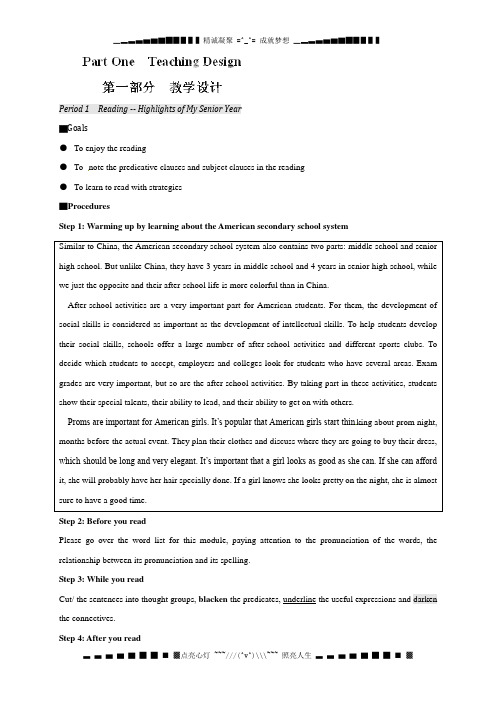陕西省南郑中学高中英语外研版选修7课件:M2P3 Language Points
- 格式:ppt
- 大小:3.34 MB
- 文档页数:35




Period 1 Reading -- Highlights of My Senior Year▇Goals●To enjoy the reading●To note the predicative clauses and subject clauses in the reading●To learn to read with strategies▇ProceduresStep 1: Warming up by learning about the American secondary school systemProms are important for American girls. It’s popular that American girls start thin king about prom night,Step 2: Before you readPlease go over the word list for this module, paying attention to the pronunciation of the words, the relationship between its pronunciation and its spelling.Step 3: While you readCut/ the sentences into thought groups, blacken the predicates, underline the useful expressions and darken the connectives.Step 4: After you read1. Copy all the useful expressions into your Expression Book. If possible, make your own sentences with these expressions.dip loma2. Drawing a diagram of the text to show its organizationHighlights of My Senior Year↓One of the best things about this year has been working as an arts editor for this newspaper.↓↓During the Easter vacation, I went on a short school skiing trip to the Rocky Mountains.↓↓Step 5: Closing up by retelling the textTo end this period we are going to retell the text with the help of the diagram above , using as many predicative and subject clauses as possible.Period 2 Function -- Expressing thoughts and opinions▇Goals●To learn to express thoughts and opinions properly▇ProceduresStep 1: Learning how to express thoughts and opinionsThere are many ways to express thoughts and opinions. We often say “In my opinion...” “It seems to me that...” “I feel...” “I find it interesting /amusing/strange that...”. Actually, we have many other expressions for this, like “In my view” “As far as I’m concerned” “As I see it” “My feeling is that...”. Here are some sentences.1. In my opinion, our paper’s too short.2. As far a s I’m concerned, our paper is as perfect as it is.3. As I see it, it could be a bit longer.4. In my view, we need a new editor.5. It seems to me that he’s very good at his job.6. I find it strange that we’re al l arguing!7. My feeling is that we should stop arguing and have a cup of tea.Step 2: PracticeTake turns to give an opinion about the students’ after-school activitiesStep 3: Closing down by listing common expressions for feelings and thoughtsPeriod 3 Grammar -- Predicative clauses and subject clauses ▇Goals●To learn about the predicative clauses and subject clauses■ProceduresStep 1: Learning about predictive clauses and subject clauses1. Subject clause: The clause is used as a subject of the main verb. Subject clauses begin with that, if, whether, who, what, which, when, where, how, why, whoever, whichever, etc.Examples:1)Why he did that wasn’t quite clear.2)How this happened is not clear.3)Where she has gone is not known yet.4)When they will start is not known yet.5)Which team will win the match is still unknown.6)Who will go makes no difference.7)What I’m looking for is a real success.8)Whether she will come or not is still a question.9)That she was able to come made us very happy.10)Whoever breaks the law should be punished.2. Predicative clause:The clause is used as a predic ate nominative of a link verb. Predicative clauses begin with that, whether, as if, who, what, which, whose, when, where, how, why, etc.Examples1)My belief is that he’s got a health problem.2)The reason why he didn’t come was that he was ill.3)My problem is whether we can accomplish it in time.4)He looked as if he was going to cry.5)The question is who can complete the difficult task.6)That’s just what we expected.7)The problem is how we can find such stuffs.Notes1. “i t” is used as the formal subject.Sometimes it is put at the beginning of a sentence and used the formal subject while the real subject clause is put at the end, because in English people usually put long or complicated items towards the end of a sentence. Therefore, it can also be called a preparatory subject.1) It is clear/certain/likely/true/surprising that...2) It is a pity/shame/good idea/ no wonder that...3) It is said/ reported/ believed/ known/ thought/ suggested that...4) It seems/ happens that...eg: It happened that I went out last night.It is said that China will win in the World Cup.It seems strange that he should have said that.It’s clear that we should do something to st op it.2. We can use whether to introduce a subject clause or predicative clause when the clause is a yes/ no question. If not used at the beginning, we can also use if to introduce the subject clause. We use whether or not, but not if or not; we use both whether... or not and if...or not.eg. Whether it is going to clear up keeps me wondering.Whether the meeting will be put off has not been decided.The question is whether they have so much money.It’s unknown whether /if he’s finished his new novel.It’s under discussion whether / if we will go backpacking or not.3.that and whatthat doesn’t work as an element in the subject or predictive clause, but usually not omitted. what must be an element of the clause.1)That he said so much was very encouraging.2)What we can’t get seems better than what we have.3)What you described is quite different from what we see now.4)What troubles me is that I can’t learn all these English idioms by heart.5)The problem is that we don’t have enough money.6)Energy is what makes things work.7)I mean what I say.8)Do what you want to do and say what you have to say.Step 2: Exercises for consolidation1. Multiple choices1._____ she will be given the job is still under discussion.A. AlthoughB. WhetherC. IfD. What2. ____ is still unknown when the president is going to make a public speech.A. WhichB. ThatC. ItD. What3. ____ books you borrow from the library should be returned in two weeks’ time.A. WhichB. WhateverC. No matterD. What4. It is suggested that _____ a while before we make a decision.A. she waitedB. she waitC. she waitsD. she will wait5. It is pretty well understood ___ controls the flow of carbon dioxide in and out of the atmosphere today. (2003 上海)A. thatB. whenC. whatD. how6._____ she couldn’t understand was ____ fewer and fewer students showed interest in her lessons. (2000上海).A. What, whyB. That, whatC. What, becauseD. Why, that7. First of all, ____we should prevent him from doing it is the most important.A. thatB. whatC. /D. which8. It moved me a bit ___ he had spent so much time in helping me with my lessons.A. ifB. thatC. whileD. because9. The reason why he didn’t pass the final examination is _____ he wasn’t interested in study.A. thatB. becauseC. /D. which10.____ is hoped that we may have the pleasure of seeing you again soon.A. ThatB. ThisC. WhichD. It11. ___ was telling a lie.A. Those who told you thatB. Anyone told youC. Whoever told youD. Whoever told you that12. ____ was of little importance.A. No matter he might pass the examB. Whether he had passed the examC. Though he might pass the examD. He might pass the examination13. ____surprised me most was ____ he was too late for the important meeting, for he was chairman of it.A. What, whyB. That, howC. What, howD. That, why14. -Have you found your key?-Yes, it was ____ I often watch TV in my room.A. whatB. whichC. howD. where15. ___ was said here must be kept a secret.A. ThatB. WhichC./D. Whatever16. ____ fashion differs from country to country may reflect the cultural differences from one aspect.A. WhatB. ThatC. ThisD. Which17. -I drove to Zhuhai for the air show last week.-Is that ____ you had a few days off? (NMET99)A. whyB. whenC. whatD. where18. ____you go or stay at home won’t make any difference.A. IfB. WhenC. ThatD. Whether19. The problem is not ____ we leave, but ____ we can get there.A. when, howB. when, whereC. how, whichD. where, when20. The reason for his success is ____ he worked hard.A. whyB. thatC. becauseD. for2. Translation1. 重要的是你做什么,而不是说什么。

